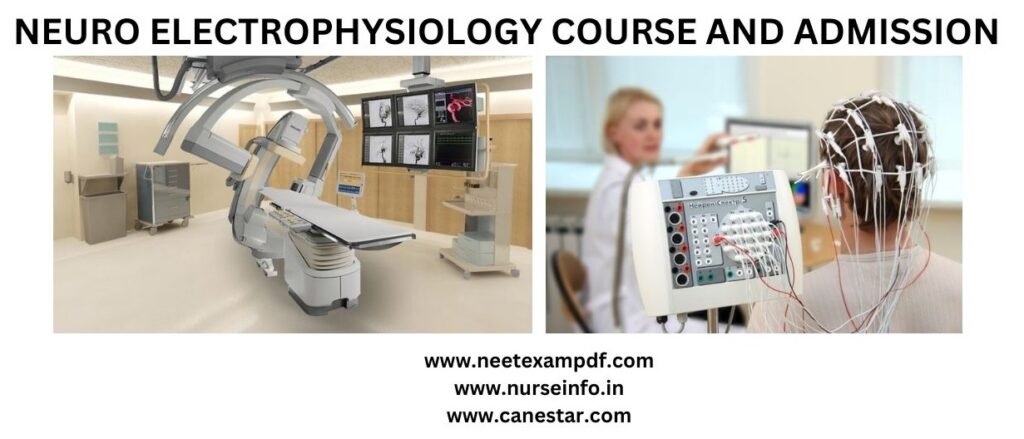NEURO ELECTROPHYSIOLOGY COURSE – COURSE, ELIGIBILITY, DURATION, COURSE CURRICULUM, FEE STRUCTURE, CAREER OPPORTUNITY (ABROAD) AND SALARY
COURSE
Neuro electrophysiology is a specialized field within neuroscience that focuses on the study of electrical activity in the nervous system.
There are several institutes and universities in India that offer courses and training in neuro electrophysiology. Here are a few notable options:
- National Institute of Mental Health and Neurosciences (NIMHANS): Located in Bangalore, NIMHANS is a premier institute for mental health and neuroscience. They offer a variety of courses related to neuroscience and electrophysiology, including a postgraduate diploma in Clinical Neurophysiology.
- All India Institute of Medical Sciences (AIIMS): AIIMS, with its various branches across the country, is a renowned institution for medical education and research. They offer courses in neurology and clinical neurophysiology that cover electrophysiology techniques.
- Indian Institute of Technology (IIT), Bombay: While IIT Bombay is primarily known for its engineering programs, they also offer courses in biomedical engineering. These programs may cover topics in neurophysiology and electrophysiology.
- Sree Chitra Tirunal Institute for Medical Sciences and Technology (SCTIMST): Located in Thiruvananthapuram, SCTIMST is an autonomous institute that specializes in medical and technology research. They offer courses in medical physiology and biomedical engineering that may include electrophysiology.
- Postgraduate Institute of Medical Education and Research (PGIMER): PGIMER in Chandigarh is another prominent medical institute that offers postgraduate courses in medical sciences, including neurology and neurophysiology.
ELIGIBILITY
The eligibility criteria for neuro electrophysiology courses in India can vary depending on the institute and the specific course. However, generally, the following requirements are common for most postgraduate courses in neuro electrophysiology:
- Educational Background: Applicants should typically have a Bachelor’s degree in a relevant field such as neuroscience, biology, medicine, biomedical engineering, or a related discipline. The degree should be obtained from a recognized university or institution.
- Minimum Percentage: Many institutes require candidates to have a minimum percentage or grade point average (GPA) in their undergraduate degree. The specific percentage or GPA requirement may vary, but it is common to see a minimum requirement of 50% or higher.
- Entrance Exams: Some institutes may require applicants to qualify in entrance exams conducted at the national or institute level. For example, institutes like NIMHANS and AIIMS often have their own entrance exams for admission to their neuro electrophysiology programs.
DURATION
The duration of neuro electrophysiology courses can vary depending on the level and type of course you pursue. Here are some common durations for different types of courses in neuro electrophysiology:
- Certificate/Diploma Courses: Certificate or diploma courses in neuro electrophysiology are typically shorter in duration and can range from a few months to a year. These courses often provide focused training on specific electrophysiological techniques or clinical applications.
- Postgraduate Diploma Courses: Postgraduate diploma courses in neuro electrophysiology are more comprehensive and can have a duration of 1 to 2 years. These courses cover a broader range of topics in neurophysiology and may include both theoretical coursework and practical training.
- Master’s Degree Programs: Master’s degree programs in neuro electrophysiology are more in-depth and can have a duration of 1 to 2 years. These programs typically include coursework, research, and practical training in various aspects of neuro electrophysiology.
- PhD Programs: If you are interested in pursuing a research career in neuro electrophysiology, you may choose to pursue a PhD program. PhD programs in neuro electrophysiology can take around 3 to 5 years to complete, during which you will conduct original research in the field under the guidance of a supervisor.
COURSE CONTENT
The content of neuro electrophysiology courses can vary depending on the level and focus of the course. However, here are some common topics that are typically covered in neuro electrophysiology courses:
- Basic Neurophysiology: An overview of the basic principles of neurophysiology, including the functioning of neurons, action potentials, synaptic transmission, and ion channels.
- Electrophysiological Techniques: Introduction to various electrophysiological techniques used in neurophysiology, such as electroencephalography (EEG), electromyography (EMG), nerve conduction studies, and patch clamp recordings.
- Neurophysiology Data Analysis: Training in analyzing and interpreting neurophysiological data obtained from experiments, including signal processing techniques, data visualization, and statistical analysis.
- Neurophysiological Recordings: Practical training in conducting neurophysiological recordings, including setting up equipment, electrode placement, and signal acquisition.
- Clinical Applications: Exploration of the clinical applications of neuro electrophysiology, such as the use of EEG in diagnosing neurological disorders, neuromodulation techniques, and functional brain mapping.
- Neurophysiology of Sensory Systems: In-depth study of the electrophysiology of sensory systems, including visual, auditory, and somatosensory systems, and how they process and transmit information.
- Neurophysiology of Motor Systems: Examination of the electrophysiological basis of motor control, motor learning, and motor disorders, including studies of motor evoked potentials and muscle activation patterns.
- Neurophysiology of Neural Networks: Understanding the electrophysiological properties of neural networks and circuits, including studies of synaptic plasticity, network oscillations, and neuronal synchrony.
- Research Methods and Ethics: Introduction to research methodologies in neuro electrophysiology, experimental design, ethical considerations, and responsible conduct of research.
- Current Advances in Neuro Electrophysiology: Exploration of recent advancements and cutting-edge techniques in the field of neuro electrophysiology, such as optogenetics, multi-electrode recordings, and brain-computer interfaces.
FEE STRUCTURE
The fee structure for neuro electrophysiology courses in India can vary significantly depending on the institute, level of the course, and whether it is a government or private institution. Additionally, fees may differ for Indian students and international students. It’s important to note that the following fee ranges are approximate and can change over time. Here are some general indications:
- Postgraduate Diploma Courses: The fee for postgraduate diploma courses in neuro electrophysiology can range from INR 50,000 to INR 2,00,000 or more for the entire program, depending on the institute and its reputation.
- Master’s Degree Programs: The fees for master’s degree programs in neuro electrophysiology can vary widely. Government institutions may charge around INR 1,00,000 to INR 5,00,000 for the entire program, while private institutions may have higher fees ranging from INR 2,00,000 to INR 10,00,000 or more.
- PhD Programs: PhD programs in neuro electrophysiology are often fully funded, meaning that students receive a stipend or scholarship to cover their tuition fees and living expenses. However, some private institutions may charge fees for their PhD programs, which can range from INR 2,00,000 to INR 10,00,000 or more.
CAREER OPPORTUNITY
A career in neuro electrophysiology offers various opportunities in both academic and clinical settings. Here are some career paths and opportunities in the field of neuro electrophysiology:
- Clinical Neurophysiologist: As a clinical neurophysiologist, you can work in hospitals, clinics, or research institutes, performing and interpreting electrophysiological tests such as EEG, EMG, nerve conduction studies, and evoked potentials. You may be involved in diagnosing and monitoring neurological disorders, assisting in surgical planning, and evaluating treatment outcomes.
- Research Scientist: With a background in neuro electrophysiology, you can pursue a career in research, working in academic institutions, government research organizations, or private research companies. You can contribute to advancing knowledge in neurophysiology, studying neural mechanisms, exploring brain function, investigating neurological disorders, and developing new therapeutic interventions.
- Academic Faculty/Professor: Many universities and educational institutions hire neuro electrophysiology experts as faculty members. As a professor, you can teach and mentor students, conduct research, publish scholarly articles, and contribute to the development of the field through your expertise and collaborations.
- Industry and Biotechnology: Pharmaceutical companies, medical device manufacturers, and biotechnology firms may employ neuro electrophysiologists to contribute to the development and evaluation of neurophysiology-related products, such as drugs, diagnostic tools, or neurostimulation devices.
- Neuropsychology and Cognitive Neuroscience: A background in neuro electrophysiology can be valuable in the field of neuropsychology and cognitive neuroscience. You can contribute to understanding brain-behavior relationships, studying cognitive processes, investigating brain disorders, and exploring the neural basis of human behavior.
- Academia-Industry Collaboration: Collaborations between academia and industry are common in the field of neuro electrophysiology. These collaborations can involve working on joint research projects, technology transfer, or consulting roles, allowing you to bridge the gap between research and practical applications.
SALARY
The salary of professionals working in neuro electrophysiology can vary depending on various factors such as geographical location, level of experience, education, industry, and the specific job role. It’s important to note that the figures provided below are approximate ranges and can vary significantly.
- Clinical Neurophysiologist: In India, the starting salary for clinical neurophysiologists can range from INR 4,00,000 to INR 8,00,000 per year. With experience and specialization, the salary can increase to INR 8,00,000 to INR 20,00,000 or more per year.
- Research Scientist: The salary of research scientists in neuro electrophysiology can vary depending on whether they work in academia, government research institutes, or private industry. In academic or government research positions, the starting salary can range from INR 4,00,000 to INR 8,00,000 per year. However, in private industry or pharmaceutical companies, the salary can be higher, ranging from INR 6,00,000 to INR 15,00,000 or more per year.
- Academic Faculty/Professor: The salary of academic faculty members in neuro electrophysiology can vary depending on the institution and the faculty position (Assistant Professor, Associate Professor, or Professor). In India, the salary for Assistant Professors can range from INR 6,00,000 to INR 10,00,000 per year, while Associate Professors can earn around INR 10,00,000 to INR 20,00,000 per year. Full Professors can have a higher salary ranging from INR 20,00,000 to INR 40,00,000 or more per year.
- Industry and Biotechnology: Salaries in the industry sector can vary significantly depending on the company, job role, and level of experience. In general, professionals working in neuro electrophysiology-related roles in the industry can earn salaries ranging from INR 6,00,000 to INR 15,00,000 or more per year.
SALARY ABROAD
The salary of professionals working in neuro electrophysiology abroad can vary significantly depending on the country, level of experience, education, industry, and specific job role. It’s important to note that the figures provided below are approximate ranges and can vary based on individual circumstances and the cost of living in each country.
- United States: In the United States, the salary of neuro electrophysiologists can range from $70,000 to $200,000 or more per year, depending on factors such as experience, specialization, and location. Academic faculty members or research scientists in prestigious institutions may earn higher salaries.
- United Kingdom: In the United Kingdom, the salary of neuro electrophysiologists can vary. Clinical neurophysiologists working in the National Health Service (NHS) can earn a starting salary of £31,000 to £47,000 per year, with experienced professionals earning up to £77,000 or more. Salaries in academic and research positions can vary but may be higher, especially at renowned institutions.
- Canada: In Canada, the salary of neuro electrophysiologists can range from CAD 60,000 to CAD 200,000 or more per year, depending on experience, specialization, and location. Salaries are typically higher in metropolitan areas and academic/research institutions.
- Australia: In Australia, the salary of neuro electrophysiologists can vary. Clinical neurophysiologists working in public hospitals can earn a starting salary of AUD 80,000 to AUD 120,000 per year, with higher salaries for those with experience. Academic and research positions may offer higher salaries, ranging from AUD 90,000 to AUD 150,000 or more.
- Germany: In Germany, salaries for neuro electrophysiologists can range from €50,000 to €100,000 or more per year, depending on experience and the type of employment (academic, clinical, industry, etc.). Salaries are influenced by factors such as the region, institution, and individual negotiation.
If you need more information, comment us below or email us.
Thank you.

